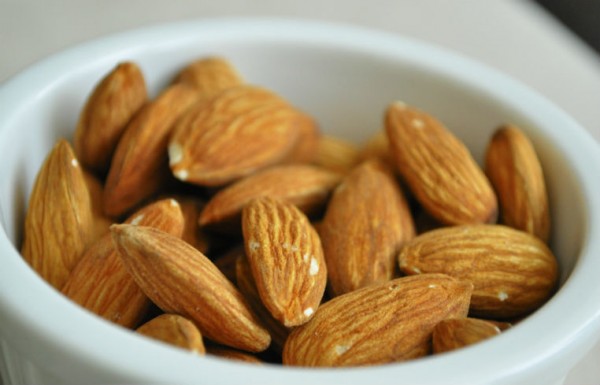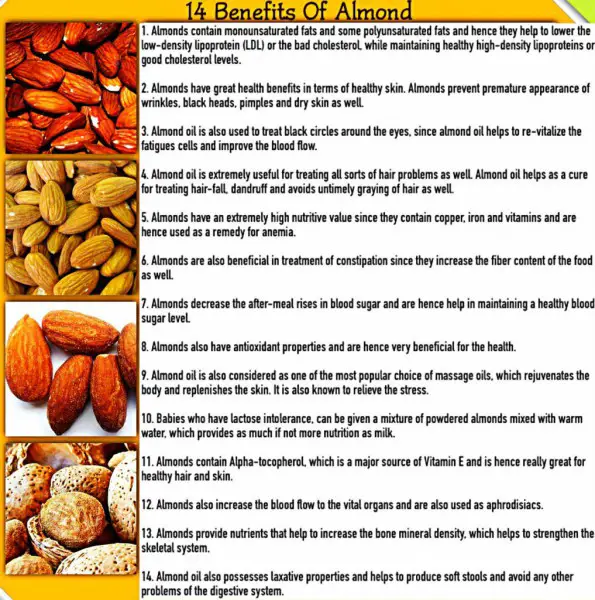Almonds is a falling tree (Prunus Dulcis) which can be seen in the Middle East and South Asia. Its characteristics are simple: leaves, pink flowers and leathery fruits. Its fruit with form of an ellipsis, is eatable and it can also be used for extraction of aromatic oils.
Almonds can be listed in the group of a rose, plum, cherry and peach. Almond has oval form and pale tan.
Almonds fall into two categories: Sweet (Prunus amygdalus var. dulcis) and Bitter (Prunus amygdalus var. amara).
- Sweet almonds is the king of almonds used as food and it is widely used in preparation of nutrition products.
- Bitter almonds is used for almond oil production or aromatic substance for liquor preparation (Amaretto).
Almonds Nutrition Facts
Almonds contains around 26% carbohydrates, more specifically 12% dietary fiber, 6.3% sugars, 0.7% starch and the rest miscellaneous carbohydrates. These are a rich source of Vitamin E, manganese, biotin and cooper. Almonds contain high quality of proteins. One third of these proteins fall into essential amino acids. Also almonds are rich in dietary fiber, B vitamins, magnesium, molybdenum, riboflavin (vitamin B2), phosphorus, essential minerals and monounsaturated fat. Furthermore, they contain phytosterols – which have cholesterol-lowering properties.
Almonds Nutrition summary:
Why Are Almonds Good For You?
Almonds are source of protein, energy fiber, calcium, iron, omega 3, magnesium, Vitamin E and potassium. They are ideal solution for healthy regulation of appetite. Rich in monounsaturated fats – almonds reduce risk of heart diseases. You cannot imagine a better source of: Vitamin E – which protects from UV light damage and Alzheimer’s disease. Manganese – a mineral which helps your body to maintain bone toughness and to regulate sugars in blood. Magnesium – also a mineral which is essential for organ function, muscles and nerve function. It regulates glucoses in blood and blood pressure.
 Eating almonds is good for your skin. They contain flavonoids which have the result of an antioxidant and increase (altogether with vitamin E) the anti-aging effect of your skin.
Eating almonds is good for your skin. They contain flavonoids which have the result of an antioxidant and increase (altogether with vitamin E) the anti-aging effect of your skin.
Benefits of Almonds
The most important benefits of eating almonds which deserve to be mentioned are the following:
- During pregnancy – almonds contain folic acid which is really important for the newborn babies. Folic acid stimulates healthy cells and tissue formation of fetus. It means that is quite important for bringing to light a healthy baby and a proper development of the newborn.
- For cholesterol – regular consummation of almonds increases the level of high density lipoproteins (HDL); decreases level of low density lipoproteins (LDL). This balance is an immense importance for keeping your cholesterol balance i.e., for reducing bad cholesterol in blood (LDL).
- For weight loss – monounsaturated fats reduces appetite. A dietary fiber makes satiated and with no wish for food. Also fibers regulate gastrointestinal tract function and helps your body throw away toxins with faster rate.
- For hair – if you consume almonds, you implicitly stimulate hair growth and increase the quality of your hair.
- For skin – it is excellent for your complexion. Often, it is used in preparation of almond oil, which is ideal for newborn babies. Moreover, almonds are used as an additive in soups and almond body milk.

Almonds and People With Health Problems
Everything adds to your health, of course if consumed properly. Every crossing of the limits conveys consequences problems. Be careful with almonds if you have problems with:
- Thyroid – almonds reduce the thyroid inhibiting compounds. They contain goitrogens – natural substances which intensity the function of thyroid gland. If you have such a thyroid disorder, reduce or put down to minimum the almond intake.
- Digestion – almonds help in the proper work of gastrointestinal tract; good digestion and reduce gastrointestinal problems. But also, overeating creates constipation.
- Kidney – almonds are severely important for kidney disease patients due to their nutritive value and against creating new kidney stones. Be careful, it you have a limited intake of some of the contain minerals: protein, phosphorus, potassium etc.
- Stomach – almonds, especially raw almonds, can cause stomach ache if you are allergic or if you exaggerate in the intake.
- Bowel – gastrointestinal problems of bowel are reduced by soluble fiber intake which are, of course, contained in almonds. But, the sulfur is also a characteristic of almonds which can cause contraindications. Sulfur, altogether with amino acids methionine and cysteine – can create gasses.
- Skin – if you are allergic to almonds, your skin will react immediately. Rashes are a constant nus reaction. It will make your skin itchy, red and swollen.
- Gallbladder – also, allergic reactions can appear in your liver and gallbladder. Among those allergens are almonds which cause gallbladder attacks.
How Much Almonds You Should Eat?
 Almonds Cure
Almonds Cure
- Headaches and migraine – a lot of magnesium, helps in pain diminishing.
- Cancer – almonds have high level of Healthline which is thought to be “the killer of cancer”.
- Heartburn and acid reflux – it is the best time to eat three almonds before having a meal. The level of amino acids helps when you have a stomach living or when you have a cut down of the acid production.
- Diabetes – almonds are rich with fiber, proteins and calories which decrease the bad cholesterol and increase the level of insulin in blood.
- Acne – almonds decrease acne flare ups. Their healthy content of zinc and Vitamin E is essential for acne annulation.
When Is The Best Time To Eat Almonds?
In the morning or noon. If it’s possible, take them skinless and hot cooked. When you feel hungry, take 3-7 almonds. You will feel satiated immediately.
Where to Store Almonds?
Storing almonds is very hard to do because they have unsaturated fat content and can easily be out of use. They should be kept in dry, cool place and hermetically closed. In order to maintain nutritive values on optimal level, their exposure on air must be diminished. Keep them in the fridge or in dark places with temperature under 30 steepens. In such conditions they can be used best in two years’ time.
Almonds are used severely in cosmetic industry. They are the basis of many cosmetic preparations, such as creams, lotions, make-up, face and body milk, foundation, etc.
They nutritive and regenerative properties only confirm the already known: Eat Almonds – Almond are Healthy!!!

